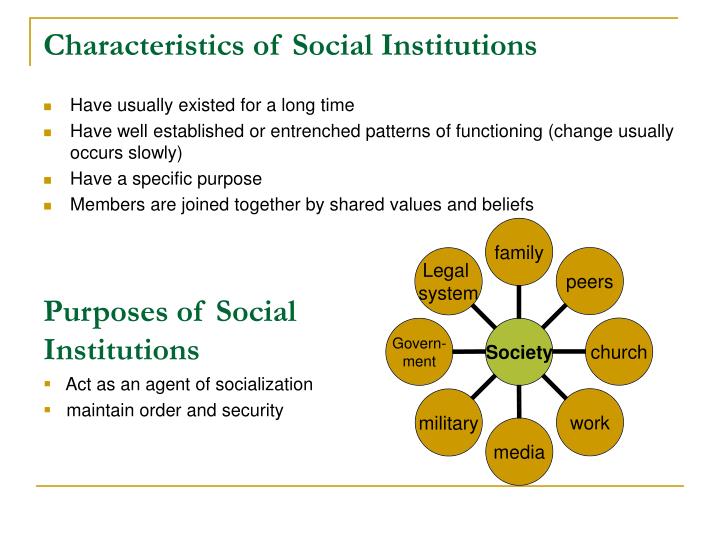Imagine a bustling city, with its towering skyscrapers, bustling streets, and diverse population. Beneath the surface of this urban tapestry lies a complex web of social structures that hold it all together. These structures are what we call social institutions. They are the invisible, yet powerful, framework upon which our society is built. From the moment we are born, to the day we die, we interact with these institutions, shaping and being shaped by their influence.

Image: snipe.fm
But what exactly are social institutions? And how do they affect our lives? This article delves into the fascinating world of social institutions, providing a comprehensive overview of their definition, history, types, and impact on our modern society.
Defining Social Institutions
Social institutions are established and enduring patterns of social behavior that are organized around meeting specific needs of a society. They are more than just rules or laws; they are the very fabric that holds society together, influencing our values, beliefs, behaviors, and interactions.
Think of social institutions as the foundation upon which a house is built. Just as a house requires a strong foundation to stand, a society relies on robust social institutions to function effectively. These institutions provide a sense of order, stability, and predictability, making it possible for individuals to live together harmoniously.
Understanding the History and Evolution of Social Institutions
Social institutions have a long and fascinating history, evolving alongside the development of human civilization. In the early days of human history, simple societies relied on informal institutions based on family structures and tribal customs. As societies became more complex, formal institutions such as government, religion, and education emerged to address the growing needs of a larger and more diverse population.
Throughout history, social institutions have played a crucial role in shaping human societies. They have provided a framework for resolving conflicts, distributing resources, transmitting knowledge, and establishing social values. From the ancient city-states of Greece and Rome to the modern nation-states of the 21st century, social institutions have been instrumental in shaping the trajectory of human progress.
Types of Social Institutions: A Diverse Landscape
Social institutions are not a monolithic entity. They encompass a wide range of structures catering to different societal needs. Here are some of the key types of social institutions:
- Family: This fundamental institution shapes our early development, providing emotional support, socialisation, and the transmission of cultural values.
- Education: Ensuring the transfer of knowledge, skills, and cultural values to future generations. It plays a crucial role in shaping individuals’ potential, promoting social mobility, and contributing to economic development.
- Religion: Providing spiritual meaning, ethical guidance, and a sense of community to individuals. It is often a source of morality, rituals, and social control.
- Government: The bedrock of political order, governing societies, maintaining law and order, providing public services, and protecting citizens’ rights.
- Economy: The system through which societies produce, distribute, and consume goods and services. It encompasses activities like production, trade, investment, and consumption.
- Healthcare: Focused on maintaining and improving the health and wellbeing of individuals, including the prevention, diagnosis, and treatment of diseases. It is an essential part of human societies, ensuring longevity and quality of life.
- Media: The powerful platform for communicating information, news, and entertainment. It plays a vital role in shaping public opinion, transmitting information, and influencing social norms.
Each of these institutions has a unique role to play in the functioning of society. They interact with and influence each other, creating a complex web of interconnected relationships. The family provides a foundation for education and socialization, while the government sets regulations that impact the economy. Media influences public opinion, shaping attitudes toward social institutions, while religion often provides ethical frameworks influencing political and economic decisions.

Image: cloudshareinfo.blogspot.com
The Changing Landscape: Social Institutions in the 21st Century
Social institutions are not static entities. They are dynamic and constantly evolving to adapt to social, economic, and technological changes. Our increasingly globalized and interconnected world is pushing social institutions to adapt to new challenges and opportunities.
The advent of the internet and social media has dramatically impacted the way we communicate, access information, and form communities.
Many social institutions are grappling with the rapid pace of technological advancements and the rise of globalisation. The growth of online education platforms challenges traditional education institutions, while the rise of social media offers new opportunities for social movements and political mobilisation. The digital revolution is reshaping the way social institutions function and interact with individuals.
Tips and Expert Advice for Navigating Social Institutions
Understanding how social institutions function can empower you to navigate them more effectively. Here are some key tips:
- Stay informed: Be aware of the current trends and developments within the social institutions you interact with. Engage with the news, research, and social media to understand the changing landscape.
- Develop your critical thinking skills: Question assumptions, analyze information critically, and evaluate different perspectives to form your own informed opinions.
- Participate actively: Engage with your local community, participate in civic activities, and contribute to shaping the institutions you believe in.
- Advocate for change: If you see areas for improvement, don’t be afraid to speak out and advocate for positive change.
- Respect diverse perspectives: Recognize that different social institutions cater to different needs and values. Approach them with open-mindedness and respect for diverse perspectives.
By actively engaging with social institutions, understanding their dynamics, and contributing to positive change, you can help shape a more just and equitable society for all.
Frequently Asked Questions (FAQ)
What are some examples of social institutions?
Examples of social institutions include family, government, education, religion, healthcare, economy, and media.
Why are social institutions important?
Social institutions provide structure, stability, and order to our lives. They help us to understand our roles in society, regulate behavior, and meet our basic needs.
How do social institutions change over time?
Social institutions are constantly evolving to adapt to social, economic, and technological changes. For example, the rise of the internet has significantly impacted the way we access information and communicate, influencing institutions like education and media.
What role do individuals play in shaping social institutions?
Individuals play a crucial role in shaping social institutions through participation, advocacy, and critical engagement. By acting as informed citizens, voicing their opinions, and contributing to positive change, individuals can influence the direction and development of social institutions.
What Are Social Institutions
https://youtube.com/watch?v=VWhDQ7FgApw
Conclusion
Social institutions are the invisible backbone of society, shaping our lives, values, and interactions. By understanding the role of these institutions, their history, and their ever-changing landscape, we can become more informed citizens and actively participate in shaping a more just and equitable society. Whether you are a student, a parent, a worker, or a member of your community, your engagement with social institutions can make a difference.
Are you interested in learning more about specific social institutions or their impact on our lives? Share your thoughts and questions in the comments below.






